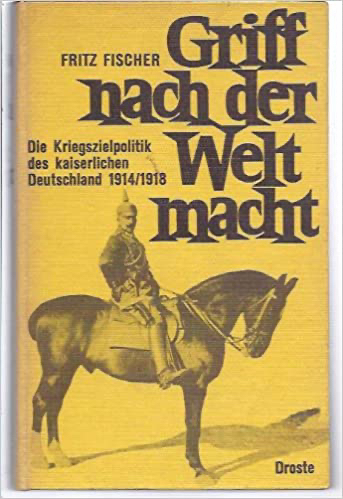
From the Rorate Caeli Twitter:
Re-read many years later, Fritz Fischer’s “Germany’s Aims in the First World War” (Griff nach der Weltmacht) seems even more convincing: it reads like a thriller, a very well-documented thriller. Highly recommended.
Griff nach der Weltmacht (The Bid for( or “Grasp after”) World Power) is one of the foundational works that sought to provide a theoretical/historical basis for the international order that emerged after World War II. It restated the thesis that the European calamities of the last century were exclusively attributable to a conspiracy of the evil Germans – a problem presumably solved by the establishment of American domination over Western Europe after 1945. To say that this analysis, as history, is questionable is the understatement of the century. What is interesting, however, is when (1961) and where (West Germany) The Bid for World Power appeared – at the start of Europe’s (and America’s) dramatic swing to the left. The historical vision of a clash between good (implicitly, the current establishment) and evil ( in this book, an earlier, no longer existing Germany) has endured until the present day – sometimes with shifting villains. So, on occasion the Poles and the Serbs have since found themselves also in the dock – much to their dismay.
The irony is, of course, that whatever its relevance may be to the origins and conduct of the First World War, just the title alone of The Bid for World Power exactly describes the course of United States policy, above all between 1939 and 1945. For it was in this period, after the abortive crusade of Wilson, that the United States definitively abandoned the status of a relatively “isolationist” power with limited foreign commitments in areas with real or imagined American economic interests (China; Latin America; the Panama Canal; the Philippines) to seek a condominium over the entire world shared with the Soviet Union. And even when that dream collapsed in the Cold War, the United States still found itself in possession of a vast world empire in all but name.
Against this backdrop, why a site that has so constantly and admirably championed Christian Europe – even the Habsburg Empire – would find The Bid for World Power “convincing,” without any reservations, escapes me. What will Rorate Caeli provide a blurb for next, Theodor W. Adorno’s Authoritarian Personality?
Related Articles
1 user responded in this post